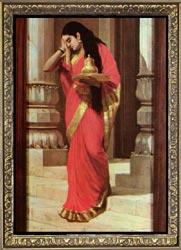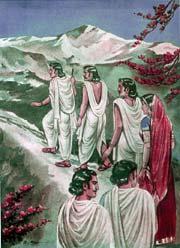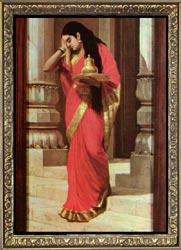Draupadi, the Woman : Epitome of Feminity and Feminism - FINAL CHAPTER





This is a very long chapter. I had to condense this entire part from 5 different sources. One particular source was my trusty little Mahabharatha book.
Draupadi succeeded in winning back freedom for her enslaved husbands. Karna paid her a remarkable tribute, saying that none of the world's renowned beautiful women have accomplished such a feat: like a boat she has rescued her husbands who were drowning in a sea of sorrows. With striking dignity she refuses to take the third boon Dhritarashtra offered, because with her husbands free and in possession of their weapons, she did not need a boon from anyone. No twenty first century feminist can surpass her in being in charge of her. Can we even imagine any woman having to suffer attempted disrobing with her husbands sitting mute; then facing abduction in the forest and having to countenance her husband forgiving the abductor; be molested again in court and be admonished by her husband for creating a scene; then be carried off to be burnt alive; thereafter, when war is imminent, witness her husbands asking Krishna to pursue peace; and finally find all her kith and kin and her sons slain - and still remain sane?
When Dhritarashtra returned their kingdom also and tried to console the Pandavas, the Kauravas were angry. They decided to play the dice again with Pandavas and whoever was defeated would have to give up the whole Kingdom and remain in the forest for twelve years, and then for another year live incognito (that is, without being recognized by others). If they were recognized by anybody during that period, then they had to repeat the twelve years' stay in the forests and spend a year incognito. This was the condition of the match. Yudhishthira was defeated again. The Pandavas gave up their royal robes and put on clothes made of bark of trees. Draupadi followed her husbands, giving up her life of luxury in palaces. So the forest life of the Pandavas began. Lord Krishna was the beloved God of Draupadi. He did not forget his devotees in the forest, but visited them now and again. Many sages also visited the Pandavas now and then and guided them. The Sun-God gave Yudhishthira an Akshaya Patra (magic vessel). This vessel would not become empty until Draupadi's meal was over. During the exile when Pandavas were in Kamyaka Forest, Duryodhana sent the short-tempered but highly knowledgeable sage Durvasha and his thousand disciples to visit Yudhishthira. His intention was to get the Pandavas cursed by the sage Durvasha. Yudhishtir invited the sage and his disciples to dine, for he was sure that by the virtue of the Akshaya Patra, he had received from the Sun, they would be able to feed the sage and his disciples. Everybody at that time, even Draupadi and Kunti had taken their meal and the Akshaya Patra was empty. Sage Durvasha went to take a bath in the Ganges. Draupadi got worried and she again prayed to Krishna to save her and her husbands from the wrath of Durvasha when he would find out that the Pandavas had nothing to offer him and his disciples as a meal. Lord Krishna reached the hut of Draupadi and ate the single grain of rice in the Akshaya Patra. There at the river bank, sage Durvasha and his disciples felt as if they had a sumptuous meal with many delicacies. Durvasha rishi blessed the Pandavas and they decided to change their course silently.
Draupadi's troubles were not yet over. Jayadrath was the king of Sindhudesha and was married to Dusshala, the daughter of Dhritarashtra. He too had gone to Draupadi's Swayamvara but had lost the contest. He could not get her by valour. During the days of the banishment to jungle of the Pandavas, one day Draupadi was leaning against a kadamba tree, holding on to a branch with an upraised hand when Jayadrath seized her. She repulsed him so hard that he fell to the ground. Retaining full control of her faculties, she mounted his chariot on finding him bent on forcing her, calmly asked the family priest to report to her husbands. No Sita-like lamentation here, nor shrill outcries for succor! As her husbands closed up on Jayadrath, she taunted him with an elaborate description of the prowess of each and the inevitable trouncing that would follow.
Draupadi was fully conscious of her beauty and its power, for she used it in getting her way with Bheema in Virata's kitchen. After the twelve years of exile in the forest was over, Pandavas had to spend a year incognito. How could five famous heroes, with a very beautiful wife, remain unknown for one full year anywhere? Would the Kauravas keep quiet? And it would be most difficult for Draupadi because she was a woman. Then they took a secret decision. Yudhishthira disguised himself as a pious Brahmin. He assumed the name of Kanaka Bhatta and entered the place of Virata, the king of Matsya country. Bheema joined service in the kitchen of Virata, taking the name of Ballav, Arjuna, to be known as Brihannala (disguised as a eunuch) taught the art of dancing to the princesses at Virata’s palace. Nakula joined the royal stables as a supervisor taking the name Granthi and Sahadeva to be known as Tantri Pal began to look after the palace dairy. Draupadi as Sairindhri went to Queen Sudeshna and begged to be taken as one of her attendants. The queen was more than surprised at the great beauty of Draupadi. When Sudeshna asked about her she introduced herself as the wife of five Gandharvas who are divine musicians. Queen Sudeshna was pleased and engaged her. Draupadi, daughter of the powerful King Drupad, wife of Pandavas who could conquer the whole world, she who sat on the throne as an empress and was accepted by Lord Krishna himself as his sister, was now a servant to Queen Sudeshna. Yet she could at least see her husbands who were at the same palace; and this was consolation.
Keechak was queen Sudeshna's younger brother, and a very strong man. Once he saw Draupadi and was moved by her great beauty. Sudeshna could make out the evil thoughts of her brother and was afraid. Without the knowledge of the Queen, begged Draupadi to be his Queen. Draupadi warned him and ran away from him. But Keechaka followed her like an evil spirit. Once he actually chased her and Draupadi ran away with fear and entered the royal court where King Virata, Kanaka Bhatta (Yudhishthira), and Ballav (Bheema) were present. Keechaka angrily pushed her and walked away. His eyes were burning. Ravaged by the insulting incident Draupadi accused the three of them of being mere onlookers while a woman was being insulted in front of them. The cook Ballav (Bheema) was hissing in anger. Yudhishthira stopped Bheema from precipitating a fight with Keechak. He also consoled Draupadi and sent her back. But Draupadi could not control her anger and agony. That night she went to Bheema and the manner in which Draupadi manipulated Bheema to destroy Keechaka is a fascinating lesson in the art and craft of sexual power. She does not turn to Arjuna, knowing him to be a true disciple of Yudhishthira as seen in the dice-game. Then Bheema alone had roared out his outrage. Draupadi enticed Keechak into a lonely place by making him follow her, while she carried a vessel of milk for him. At an opportune moment, Bheema pounced on Keechak while Draupadi watched. When Keechaka had been pounded to death by Bheema, instead of hiding in safety she recklessly flaunts the corpse before his kin, reveling in her revenge. They abduct her and she has again to be saved by Bheema from being burnt to death.
This fiery heroine Draupadi was not without kindness and affection. She was insulted, taunted and driven to the forest by the sons of Dhritarashtra and Gandhari. When, Dusshasana pulled at her saree, Dhritarashtra and Gandhari would not help her. But after the war of Mahabharata, Draupadi looked after Gandhari with respect and affection; she treated her in the same way as she treated Kunti. She had a resolve that would not cool off after thirteen long years of suffering, and also sympathy for Gandhari after all was over.
When Aswathama (son of Dronacharya) who killed the sons of Draupadi, in spite of her great grief at the loss of her children, came to Pandavas, she moved forward and touched his feet and paid him his due respect. Bheema was unable to bear such sorrow and because of this, he was in great emotions which drove him to the point of exhibiting his physical prowess to the world. In fact he was looking at this quality of forbearance of Draupadi as a laughing matter. Bheema was greatly surprised at the peaceful attitude of Draupadi. He thought that the suffering of having lost all her children had driven her to insanity, for, otherwise he was not able to understand how a true mother could show such forbearance when the person who had killed all her children was standing before her. Draupadi was a great woman with exemplary character. When the strong Bheema was preparing to kill Aswathama with his bare hands, would it be possible for a weakling like Draupadi to go and stop Bheema? It was only the purity of her thought that was her strength. Draupadi was such a great woman that in order to protect right conduct, she would even oppose her husbands. But even now, it was Bheema who tried to avenge the death of her sons by uprooting the Shiromani (divine diamond) off the forehead of Aswathama and thus ending his powers of invincibility.
Draupadi maintained the reputation of her husbands, her parents and parents-in-law. She wanted her parents to be proud of her, she wanted her children to feel that they are the children of a great mother, she wanted her husbands to feel that they were married to a great woman and she wanted her parents-in-law to be proud of her and she wanted to please them. Draupadi herself was always behaving in a manner in which she maintained the reputation of her family and her kingdom.
Ultimately, the fact that Draupadi stands quite apart from her five husbands is brought tellingly home when not even Sahadeva of whom she took care with maternal solicitude, nor her favorite Arjuna - tarries by her side when she falls and lies dying husbanded yet unprotected, on the Himalayan slopes during their journey to heaven - the Mahaprasthana. It is said, however, in some analyses of the Mahabharata that only Bheema, at such a juncture tried to save her from her fall from the cliffs by extending an unsuccessful hand to catch her. He failed and Draupadi fell to the ground below and was dying a painful death when Bheema came to her side, consoled her and remained by her side till she eventually died. During these last moments, it is said, Draupadi realized the futility of her undying love for Arjuna and felt the selfless and unconditional love and support that Bheema had provided her at each moment in her life and repented the fact that she could never reciprocate the love of Bheema in equal terms.
Draupadi appears from the flames with a divine announcement from the heavens that she would be the cause of destruction of evil-warriors. Draupadi is always subjected to violence: her Swayamvara ends in strife; a fivefold marriage is imposed upon her; she is outraged in the royal court twice over; Jayadrath and Keechaka attempted to rape her. Draupadi is also veritably a virgin goddess of war. The birth of Draupadi was unnatural without having a mother. If Draupadi had hoped to find her missing mother in her mother-in-law, she was tragically deceived as Kunti thrusts her into a polyandrous marriage that exposes her to a salacious gossip reaching a horrendous climax in Karna calling her a public woman whose being clothed or naked immaterial. No other woman has had to face this peculiar predicament of dealing with five husbands now as spouse, then as elder or younger brother-in-law (to be treated like a father or as a son respectively) in an unending cycle.
Draupadi is 'Krishna Sakhi'. 'Sakhi' means friend. She was a courageous queen with a dynamic personality. Even Duryodhana grudgingly admitted to her greatness. She was in a way, the revolving kingpin of the Mahabharata war. Draupadi does not rest till the revenge for which her father had invoked her manifestation is complete and the insult she suffered has been wiped out in blood. Through the thirteen years of exile, she never allowed her husbands and her sakha to forget how she was outraged and they were deceitfully deprived of their kingdom. When she finds all her husbands, except Sahadeva, in favor of peace, she brings to bear all her feminine charm to turn the course of events inexorably towards war. Pouring out a litany of her injuries, she takes up her serpent-like thick glossy hair and with tearful eyes urges Lord Krishna to recall these tresses when He asks for peace. Sobbing, she declares that her five sons led by Abhimanyu and her old father and brothers will avenge her if her husbands will not.
Draupadi was used by everybody. Draupadi was used first by King Drupad to take revenge on Drona by securing the alliance of the Pandavas and then by Kunti and the Pandavas to win their kingdom thrice over (first through marriage, then in the first dice game when she wins them their freedom; finally as their incessant goal on the path to victory). Unknown to her, even sakha Krishna throws her in as the ultimate temptation in Karna's way when seeking to win him over to the Pandavas before the war, assuring that Draupadi will come to him in the sixth part of the day. Karna was also borne by Kunti's womb, albeit before her marriage to Pandu. These efforts of Krishna are followed by Kunti urging Karna to enjoy Yudhishthira's Shri (another name of Draupadi) which was acquired by Arjuna. There is an unmistakable harking back to her command to her sons to enjoy what they had brought together when Bheema and Arjuna had announced their arrival with Draupadi as alms. No wonder Draupadi laments that she has none to call her own, when even her sakha unhesitatingly uses her as bait! Draupadi, despite having husbands and children, remains alone to the last.
This remarkable "virgin" never asked anything for herself. Born unwanted, thrust abruptly into a polyandrous marriage, she seems to have had a profound awareness of being an instrument in bringing about the extinction of an effete epoch so that a new age could take birth. And being so aware, Draupadi offered her entire being as a flaming sacrifice in that holocaust of which Krishna was the presiding deity.
Draupadi is the most complex and controversial female character in Hindu literature. On one hand, she could be womanly, compassionate and generous and on the other, she could wreak havoc on those who did her wrong. She was never ready to compromise on either her rights as a daughter-in-law or even on the rights of the Pandavas and remained ever ready to fight back or avenge high-handedness and injustice meted out to her modesty. She secretly vowed that one day she would definitely seek vendetta on the injustice meted out to her. She did it by igniting the spark of revenge in the hearts of the Pandavas. If the Mahabharata is an intricately woven saga of hatred and love, bloodshed and noble thoughts, courage and cowardice, beauty and gentleness, victory and defeat, then Draupadi is its shining jewel, casting the shadow of her towering personality over the epic poem and the all-destroying war it describes.
No comments:
Post a Comment